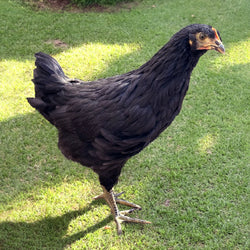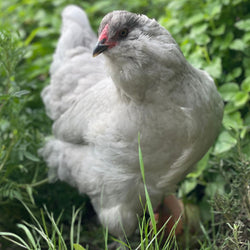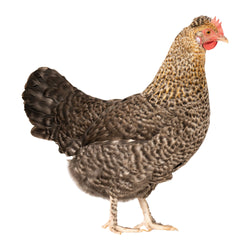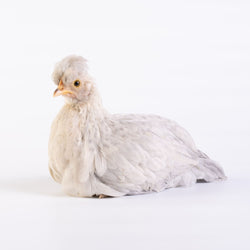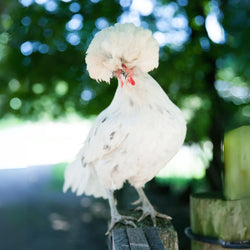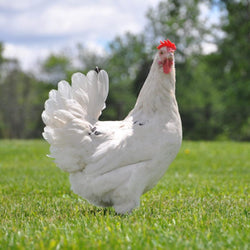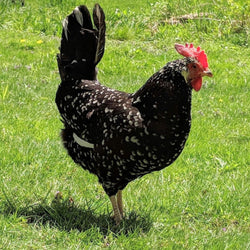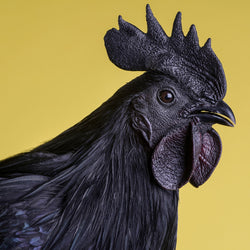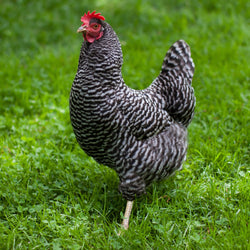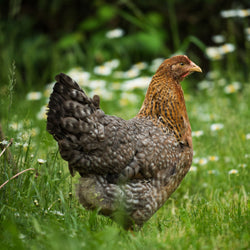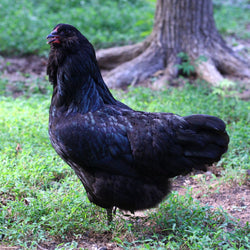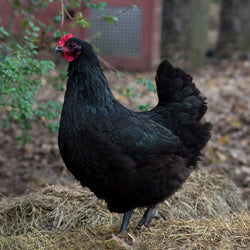page=7/--
Frequently Asked Questions
Here we answer the most commonly-asked questions about ordering, chicken care, and more.
Do chickens like music in the coop?
Some evidence in Australia and New Zealand has indicated that music may help to keep chickens calm and happy, thus helping them to grow larger, faster. The relationship to egg laying rate has not been seen on a large scale (that we are aware of). You might be interested to read this article about music as related to growth in chickens in Taiwan. Belgian Bearded D'Uccle hen This is also an oft-used science project for kids, too. If you decide to try a science project, please let us know your results!
Read MoreHow do you get such beautiful photos of your chickens?
Yes, chickens can be difficult to photograph, can't they? Much like little kids, they're not really interested in cooperating with you to get you a good shot, and they certainly don't want to hold still! There are some techniques our My Pet Chicken photographers use that you won't really be able to reproduce at home. For instance, many of our photos are studio shots, where the chickens are inside under carefully arranged lighting conditions and with high-end equipment to make for especially good professional photos. And we photograph many of our birds at competitive Poultry Shows, where the birds are...
Read MoreWhich chicken breed has the quietest, tamest hens??
Hens of most breeds are rather quiet except for right before and right after they have laid an egg. Then they may make a loud "announcement" about it for a few minutes, usually called a cackle. They seem to be very proud of their accomplishment! Some breeds like Brahmas, Australorps, Faverolles and Mille Fleur D'Uccles are often specifically described as being quiet, but frankly I've never seen too awful much difference between a "quiet" breed and a "normal" breed in my flock. Hens of most breeds are fairly unobtrusive. Antwerp Belgian Bantam hen Young pullets who have just begun to...
Read MoreShould I order extra chickens so enough survive into adulthood?
Normally you want to order the number of chickens you want to end up with---don't order extras with the expectation that some will die. But there are a few considerations you may want to take into account. Whether you lose any over the course of bringing them to laying age will also depend in part on the conditions you provide for them at your home. For instance, if your brooder isn't hot enough---or if it's too hot!---you may lose some chicks. Baby chicks can drown in waterers that are too deep, and if waterers or feeders are not securely seated,...
Read MoreAre there any plants that are poisonous to chickens that I should eliminate from my yard?
Naturally, some plants are poisonous to chickens, just as there are plants that are poisonous to other pets like cats and dogs. It's problematic to come up with an absolute list of what not to have in your yard, though. In many, if not most, cases, just having a plant in your yard that is poisonous won't necessarily cause problems. For instance, daffodils are poisonous to most animals, including chickens. But many people have dogs or cats as well as pretty spring gardens in their yards, because dogs and cats generally won't eat these poisonous plants. Similarly, my chickens just...
Read MoreI want all my eggs to hatch, so is there any type of chicken breed that has a higher hatching rate for their eggs?
This is one of those questions where it's hard to tell what exactly you're asking, a question that tells us you're probably a beginner at incubation. Remember, fertility rates are different than hatching rates. Even when the eggs you place in your incubator are 100% fertile, you may get zero of them to hatch. This is because if the conditions aren't just right---if your incubator is too hot or too cold (or too humid or not humid enough, etc.)---the eggs may not hatch in those sub-optimal conditions. So, hatching rates are dependent on YOU, and how well you or your...
Read MoreWhich breed of chicken is most predator resistant?
What are we talking about here--force fields? Body armor? No--unfortunately, no breed of chicken is "predator resistant." The only way to prevent predator attacks is to keep your flock in a secure run and coop at all times. Remember, too, that if you have a run that is NOT secure and a predator gets into it, your birds will have no means of escape. If they were ranging, they could run or fly away! Not so in a coop or run where they may be trapped with any hungry predator who gets in. It can help to keep a fierce...
Read MoreCan a hen can turn into a rooster?
No, but we can give you some background information and share the crazy way that rumor may have gotten started! It IS true that, if your hen has had some damage to her reproductive system (such as an infection in her ovaries), she might begin to look like a rooster on the outside---and act like one---due to a hormone imbalance! Such a hen wouldn't lay eggs, and may even begin to crow. At her molt, she may grow in the same plumage roosters have in her breed. If her infection or condition then cleared up, she might begin laying anew,...
Read More







"The Clubhouse" Coop
Easy to assemble and built to last, the Clubhouse Coop is the perfect starter coop for a small flock.
